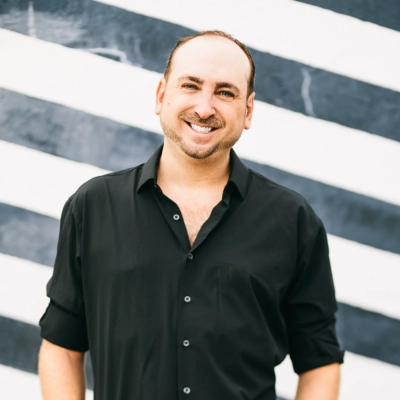Everyone has faced a significant failure that has shaped their personal development, and industry leaders are no exception. Featuring insights from an owner and CEO and a promoter, this article uncovers the profound lessons learned from such experiences. With twenty expert contributions, it starts with the importance of prioritizing oneself and embracing authenticity, and concludes with turning setbacks into opportunities. Read on to discover the invaluable wisdom shared by these accomplished professionals.
- Prioritize Yourself and Embrace Authenticity
- Learn the Importance of Clear Communication
- Align Enthusiasm with Data-Driven Decisions
- Value Team Input for Better Results
- Build Foundations Before Scaling
- Delegate and Set Boundaries
- Manage Client Expectations Transparently
- Balance Trust and Control in Leadership
- Prioritize Health and Family
- Embrace Rejection as a Growth Opportunity
- Simplify Your Message for Clients
- Incorporate User Feedback in Development
- Implement Airtight Processes for Reliability
- Communicate Your Value and Set Boundaries
- Pivot from Automation to High-Touch Service
- Plan Logistics for Efficient Growth
- Overcome Fear of Failure
- Research and Understand Client Needs
- Use Authentic Strategies for Online Presence
- Turn Setbacks into Opportunities
Prioritize Yourself and Embrace Authenticity
One of the most significant failures in my life was trying to meet everyone else’s expectations while neglecting my own needs and desires. For years, I was caught in a cycle of striving for external validation, and it left me feeling unfulfilled and disconnected from who I truly was. This need to please others was rooted in fear-fear of rejection, fear of failure, and fear of not being “enough.”
The turning point came when I burned out emotionally and physically. I realized I couldn’t keep living for others and ignoring my own well-being. That failure taught me the invaluable lesson of prioritizing myself and embracing my authenticity. It was a reminder that my worth isn’t determined by others’ approval but by how I show up for myself and honor my own journey.
Since then, I’ve built my life around confidence, self-respect, and authenticity. It shaped my mission to help others, especially women, embrace their true selves without apology. My advice? Don’t fear failure—see it as a teacher. Each misstep is an opportunity to learn, grow, and redefine your path. Failing forward is how I’ve grown into the person I am today, and I wouldn’t trade those lessons for anything.
 Sheena Yap Chan
Sheena Yap Chan
Wall Street Journal Bestselling Author
Learn the Importance of Clear Communication
One of the most pivotal failures in my career came early on when I misjudged a client’s understanding of the mortgage process. I assumed they had done enough research and didn’t take the time to fully explain some of the nuances of their loan terms. When an unexpected cost arose during closing, they felt blindsided and frustrated, and I felt I had let them down. It was a tough experience because I pride myself on transparency and guiding my clients confidently through the process. While we were able to resolve the issue, the moment stayed with me as a reminder of the importance of clear, proactive communication—never assume someone understands what hasn’t been explicitly discussed.
That experience fundamentally changed the way I approach my work. Now, I prioritize over-communicating rather than risking miscommunication. I break down every step, from preapproval to closing, ensuring clients not only understand but feel empowered by the process. It also taught me to ask more questions upfront to gauge their comfort level and knowledge, tailoring my approach to their needs. This shift in perspective has not only strengthened my relationships with clients but has also made me a more empathetic and effective professional. Failure, while painful, often becomes the foundation for your greatest growth when you’re willing to learn from it.
 Shirley Mueller
Shirley Mueller
Owner and CEO, VA Loans Texas
Align Enthusiasm with Data-Driven Decisions
One personal failure that profoundly shaped me was an early attempt at expanding into a niche product line without proper market research. I assumed my passion for the product would resonate with customers, but sales fell flat. The inventory sat unsold, tying up capital and resources we desperately needed elsewhere.
That failure taught me the importance of aligning personal enthusiasm with data-driven decision-making. I learned to prioritize understanding my audience’s needs over my assumptions.
Now, every expansion is backed by customer feedback, market analysis, and small-scale testing before fully committing. This experience strengthened the value of humility and adaptability in business and made me a more decisive leader. It reminded me that failures aren’t setbacks—they’re stepping stones for growth.
 Peter Elliott
Peter Elliott
Promoter, MoreSports
Value Team Input for Better Results
One of my biggest failures came early on when I undervalued the importance of team input. I decided to invest in new scheduling software without consulting my technicians, thinking I knew best. The system didn’t align with their workflow, leading to frustration and wasted resources.
The lesson? Collaboration is key. I learned to involve my team in decisions that directly impact them. Their frontline insights are invaluable and often lead to better results.
This failure reshaped my leadership approach. Now, I cultivate a culture where everyone’s voice matters, and we make decisions together. It built trust and improved the company’s efficiency. My advice? Don’t let pride or urgency close you off from input. Sometimes, the best solutions come from listening to the people around you.
 Kenny Dave
Kenny Dave
CEO, Garage Door Experts
Build Foundations Before Scaling
Early in my career, I underestimated the challenges of scaling a business. I focused too heavily on client acquisition without giving equal attention to internal processes and team capacity. As demand grew, this imbalance created bottlenecks, delayed projects, and placed undue stress on the small team I had assembled. I vividly recall losing a key client during this time because our internal inefficiencies failed to meet their expectations. It was a painful wake-up call, forcing me to confront the limits of my leadership and operational planning at the time.
That failure taught me that growth without structure is unsustainable. I learned to prioritize building scalable systems and to delegate responsibility effectively. I invested in training my team, hiring strategically, and implementing tools to streamline workflows, which have since become the backbone of our success. Most importantly, I learned to pause and assess the firm’s capacity regularly, ensuring that we grow at a pace aligned with our resources. This experience has shaped not only how I lead my business but also how I advise clients: emphasizing preparation and thoughtful planning as essential for sustainable success.
 Ed Hones
Ed Hones
Attorney at Law, Hones Law Employment Lawyers PLLC
Delegate and Set Boundaries
One failure that significantly contributed to my personal development occurred when I took on too much too quickly while growing my businesses. I was trying to oversee several projects and responsibilities, believing I could handle everything independently, which eventually led to burnout. I learned that delegation and setting boundaries are crucial for long-term success. This experience taught me the importance of self-care and the need to build a supportive team to help share the workload. It also helped me understand that sustainable growth comes from strategic focus and knowing when to say no. Since then, I’ve emphasized balance and empowering my team, which has led to more thoughtful decision-making and a healthier work-life dynamic.
 Kristin Marquet
Kristin Marquet
Founder & Creative Director, Marquet Media
Manage Client Expectations Transparently
One personal failure that stands out occurred early on when we struggled with managing client expectations. We had taken on a large project, and to impress, I over-promised on delivery timelines and underestimated the complexities involved.
When we missed the deadlines, it resulted in strained relationships and a loss of trust with that client. It was a humbling experience, but it taught me the critical importance of transparency and realistic planning.
I realized that it’s better to under-promise and over-deliver than to risk over-promising and disappointing clients. Since then, I’ve prioritized clear communication, setting achievable expectations, and continuously updating clients on progress.
This failure ultimately shaped my leadership style, making me more focused on building trust through honesty and ensuring that our team only commits to what we can confidently deliver. It was a tough lesson, but one that has made our business stronger and more resilient in the long run.
 Aseem Jha
Aseem Jha
Founder, Legal Consulting Pro
Balance Trust and Control in Leadership
One personal mistake that greatly hampered my own growth was depending too much on someone to manage a crucial job and then seeing it fail catastrophically. Even with people I thought I could rely on, this encounter was a sobering reminder of the need for careful screening and keeping control.
It occurred while on a project for a well-known client. I had brought on a seasoned developer recommended highly to oversee a key component of the system. With his stellar performance, I had total confidence in his ability and decided to let him run that aspect of the project free will.
But as the weeks passed, I began to see alarming indicators: deliverables were regularly delayed, communication was lacking, and the work’s quality was poor. Growing uncomfortable, I first hesitated to step in not wanting to compromise the developer’s autonomy.
But it became agonizingly evident as the deadline drew near that the project was seriously threatened. The developer produced code full of bugs, made important architectural decisions without consulting the team, and had slipped behind schedule. My team and I had to work long hours to pick up the pieces and provide a working solution after scrambling to save the situation, costing the company major time and money.
It was a humiliating and annoying experience, and I felt quite let down in myself for not being more alert. I had let my faith in the developer’s abilities distort my judgment, so allowing me to give up control in a way that finally proved ineffective.
The knowledge gained from this setback was priceless. I came to see that even seasoned experts should keep some degree of control and routinely evaluate the advancement of important tasks. I have to confirm that someone is keeping true to the vision and requirements of the project regardless of how much I could trust them to be delivering on.
Although the first failure was certainly annoying, it eventually improved my managerial skills and sharpened my judgment. The careful balancing act I discovered between guaranteeing responsibility and empowering my team has paid off in the timely completion of later initiatives.
This encounter made me realize that, particularly in high-stakes activities, trust has to be acquired and confirmed even with the best of intentions. Though challenging, this lesson has surely helped me both personally and professionally to advance.
 Elvis Sun
Elvis Sun
Software Engineer & Founder, Press Pulse
Prioritize Health and Family
Early in my first business, I made a significant sacrifice in pursuit of success. I gave up everything—my health, hobbies, and, most importantly, time with my young family. I believed that focusing all my energy on my business would be the key to its success, and it seemed to work for a while. However, as time went on, the neglect of personal well-being and family began to take a toll.
It all came to a head with a health scare and a family crisis. I realized how out of sync my life had become, and it was a wake-up call. I had been so focused on building my business that I lost sight of the things that truly mattered. My health was deteriorating, and my relationships were strained. This experience forced me to confront the need for harmony between my work and personal life.
I learned that business success is only possible with health, happiness, and strong relationships. Since then, I’ve made a conscious effort to prioritize self-care and family time while still driving my business forward. But it’s a delicate balance. When you do what you love, it’s easy to fall into the trap of overworking. I continually strive for it, and while I’ve made progress, it’s an ongoing challenge.
This failure taught me that achieving success doesn’t mean sacrificing everything else that makes life fulfilling. I carry this lesson with me daily as I navigate the demands of work and personal life.
 Rhett Power
Rhett Power
CEO and Co-Founder, Accountability Inc.
Embrace Rejection as a Growth Opportunity
When I wrote my deeply personal book about how hiking can change your life, I thought I was ready for the world to embrace it. I got an agent easily, and she was convinced we’d see bidding wars. Instead, I faced rejection—62 times, to be exact. At first, it crushed me. After each initial rejection, I would spend the day in bed eating ice cream and questioning everything.
But as the rejections piled up, I had a realization: I couldn’t keep crumbling every time a door closed. Slowly, I learned to sit with the discomfort of failure without letting it derail me. Each “no” became an opportunity to practice resilience.
This wasn’t an easy transformation, but it was worth every rejection. Over time, I stopped seeing failure as failure and began viewing it as growth. I started taking bigger risks, knowing that rejection didn’t define me or my work—it was simply part of the process.
The lesson? Failure isn’t the end—it’s a step toward growth. The more we embrace it, the less power it has over us, and the braver we become.
 Laurel Robbins
Laurel Robbins
Founder, Monkeys and Mountains Hiking & Adventure Travel
Simplify Your Message for Clients
Early in my career, I underestimated the importance of clear communication when pitching a complex manufacturing project to a potential client. I focused heavily on technical details, assuming they shared the same depth of industry knowledge. As a result, the client chose a competitor who presented their solution in simpler, more relatable terms. This failure taught me that even the best solutions need to be communicated in a way that resonates with the audience’s perspective.
Since then, I’ve prioritized tailoring my messaging to the client’s understanding, using clear language and visual aids to bridge any knowledge gaps. This approach has significantly improved client relationships and conversion rates. My advice: listen more, simplify your message, and always aim to align with your audience’s needs and expectations.
 Ronan Ye
Ronan Ye
Founder, 3ERP
Incorporate User Feedback in Development
I’ve encountered my fair share of failures. One that stands out happened early on when I underestimated the importance of user feedback during our platform’s early development stages. We were so caught up in the technical aspects that we forgot to fully consider the user experience. Unfortunately, this led to a launch where the features didn’t connect with our audience, resulting in lower engagement than we had hoped for.
Although that moment was tough, it was an essential learning curve. I quickly realized that listening to your audience is just as important as perfecting your product. Ever since, I’ve made user feedback a regular part of our development cycle, making sure our games align with their needs. I also started embracing failure, not as an end but as an opportunity to adjust and refine our approach.
That experience reshaped how I approach product development and customer relationships. It helped me shift focus from purely technical solutions to creating a more user-centric platform, something I continue to prioritize today.
 Marin Cristian-Ovidiu
Marin Cristian-Ovidiu
CEO, Online Games
Implement Airtight Processes for Reliability
Once, I missed a client’s sales tax deadline because I relied on verbal reminders instead of setting clear systems. It led to penalties for the client and a tough conversation for me. It was a wake-up call—I realized the importance of having airtight processes. From then on, I started using automated reminders, created detailed checklists, and doubled down on proactive communication with clients. That failure taught me that structure and accountability aren’t optional—they’re essential. It made me a better, more reliable professional, and I’ve never missed a deadline since.
 Michael Hayden
Michael Hayden
Accountant | Business Owner, MH Services
Communicate Your Value and Set Boundaries
“Begin with the end in mind” is a phrase I’ve heard countless times, but its profound meaning often goes unnoticed, especially by those just starting their careers. Many young adults venturing out on their workplace journeys could avoid a great deal of heartache and disappointment by being just a little mindful of the wisdom this phrase offers: to start with a clear vision of where they want to go and how they want to grow.
What exactly does this mean? For me, it meant realizing—perhaps too late—that entering the workforce with confidence in my value could have set a better precedent. Like so many others, I initially approached the workplace timidly, unsure of how to assert boundaries or ask for fair compensation. I feared rocking the boat, so I tried to make myself indispensable by adding tasks to my plate and eagerly volunteering for extra work. I believed that proving my worth this way would guarantee my survival in the workplace.
However, I quickly learned a tough lesson: office politics often dictate that extra work can go unacknowledged or even be taken for granted. My well-intentioned efforts to go above and beyond didn’t lead to the recognition or growth I’d hoped for. Instead, I found myself feeling undervalued and stuck in a cycle of overextension.
Through this experience, I’ve learned the critical importance of balancing effort with strategy. By understanding my worth and communicating it effectively, I’ve been able to advocate for myself in ways that lead to genuine respect and fair compensation. No longer am I afraid to set boundaries or to voice my needs; whether that means negotiating pay, declining unreasonable tasks, or asking for resources to support my success.
At the end of the day, it all boils down to communication. Whether it’s advocating for your needs or clarifying your goals, the ability to communicate effectively is what ultimately paves the way for professional and personal growth.
My final takeaway: Confidence in your value, paired with clear communication, is the foundation of success. Begin with the end in mind—know your worth, set your goals, and don’t be afraid to advocate for yourself. Every lesson learned along the way will shape a stronger, more empowered version of yourself.
 Doreen Nunez
Doreen Nunez
Founder, Mommy Rheum
Pivot from Automation to High-Touch Service
I once poured my heart (and a fair amount of cash) into building a SaaS-type app, convinced it would revolutionize the way marketers operated. Spoiler alert: it didn’t. Turns out, the market wasn’t quite as enthusiastic as I was. After licking my wounds, I realized that my true strength wasn’t in trying to automate everything-it was in providing a high-touch, service-based experience that delivered real results. So, I pivoted to a service model, and it’s been a game-changer. The big lesson? Corny as it sounds, failure isn’t the end—it’s just a redirection. Sometimes, the best ideas come when Plan A doesn’t pan out.
 Justin Belmont
Justin Belmont
Founder & CEO, Prose
Plan Logistics for Efficient Growth
Some of the most major personal challenges included underestimating the complexity of logistics and supply chain management in the early days. We tried scaling fast and needed to realize the importance of aligning delivery capabilities with customer demand, causing delays and operational inefficiencies that, for a while, took some cuts in terms of customer satisfaction.
I then learned how crucial good planning was and the need to invest in scalable systems from the start. We pivoted quickly: robust forecasting tools and a strong partnership with reliable vendors were introduced. That failure reshaped my views on growth, evidencing the importance of quality and efficiency over speed.
The lessons these have taught us are of greater significance; however, they not only improved our operations but furthered my resilience and adaptability as a leader. It’s a reminder that every challenge, when approached with humility and determination, can lead to significant personal and professional growth.
 Eric Sornoso
Eric Sornoso
Co-Founder, Mealfan
Overcome Fear of Failure
As a sophomore in high school, I participated in tryouts for my school’s basketball team. Tryouts were tough and I wasn’t as good as I wanted to be. Without talking to anyone, I dropped out of the tryouts. I felt ashamed that I wasn’t better at the sport and didn’t want to live through the perceived embarrassment of not making the team. Regardless of how right or wrong I was, I didn’t give myself the chance to try. I wish I could say that was the last time I let my insecurities about failing get in my way. I do see now, decades later, that I’ve grown from every time I’ve let a fear of failure influence my decision-making. And importantly, I’m able to give my past selves grace for the feelings that drove me to think I wasn’t good enough.
 Kerrie Carden
Kerrie Carden
Founder & CEO, Equip Advisory
Research and Understand Client Needs
I remember a time in my career when I faced a major failure that left me feeling defeated and questioning my abilities. I was leading a team to secure a large contract with a potential client, and after months of preparation and hard work, we lost the bid to a competitor.
At first, I was devastated. All the effort and resources invested seemed wasted, not to mention the hit to our company’s reputation. I took some time for self-reflection instead of dwelling on the loss and realized that this experience taught me valuable lessons that have contributed significantly to my personal development.
I learned the importance of thorough research and understanding the client’s needs before pitching a proposal. In retrospect, we had not fully grasped what the client was looking for, and our proposal did not address their specific pain points. This failure taught me to always listen attentively and ask relevant questions during initial meetings with potential clients.
This experience reminded me of the importance of teamwork and effective communication within a team. Looking back, I could see where some miscommunication led to errors in our proposal, which ultimately cost us the contract. As a result, I have since implemented regular check-ins and clear channels of communication within my teams to prevent such mistakes from happening again.
 Max Avery
Max Avery
Chief Business Development Officer, Syndicately
Use Authentic Strategies for Online Presence
Early in my career, I made a huge mistake trying to outsmart Google’s local search system. I created fake business locations thinking it would help my clients rank better—rookie move. Those made-up addresses worked for about a minute until Google caught on and destroyed my clients’ online presence. That failure taught me the most important lesson of my career. Now I help real estate agents build their online presence the right way—with real locations, genuine community involvement, and authentic content that actually helps their customers.
 Aaron Franklin
Aaron Franklin
Head of Growth, Ylopo
Turn Setbacks into Opportunities
What if I told you that failure could be your greatest asset? My journey is proof that every setback can lead to a breakthrough. Before launching my current company, I founded AdVolve and introduced the Mirage Mirror, an innovative interactive ad display for venues like restaurants and stadiums. While the concept was bold, the road was anything but smooth—funding struggles, adoption challenges, and countless roadblocks tested my resolve.
Those tough lessons taught me to embrace resilience, adaptability, and persistence in the face of adversity. They also fueled my passion for storytelling and authentic connections, which became the foundation of my business. Through this journey, I’ve discovered that success isn’t about avoiding failure—it’s about turning it into an opportunity to grow stronger and smarter. Let me share how I’ve turned “oops” into opportunities and why resilience will always outshine perfection.
 Bryce North
Bryce North
Founder, Don’t Be A Little Pitch

